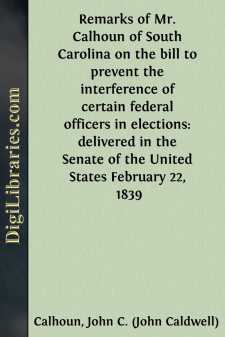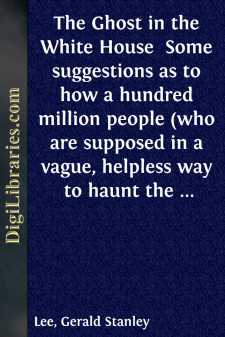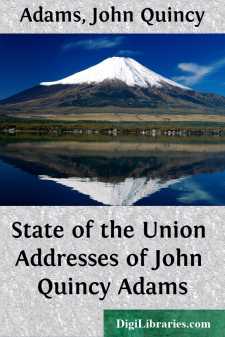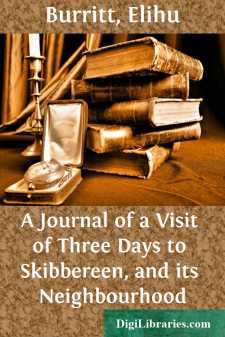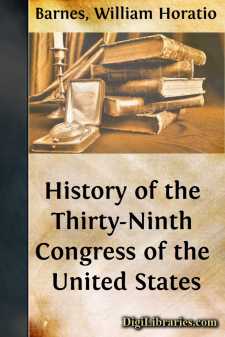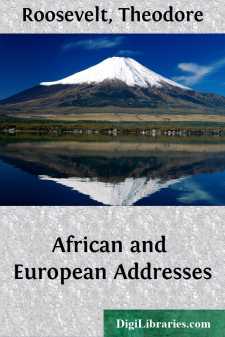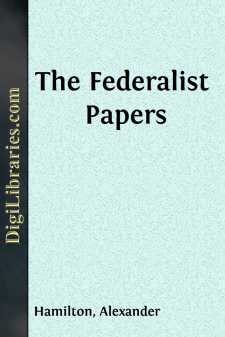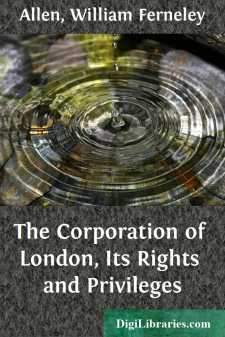Political Science
Political Science Books
Sort by:
Mr. President: At the last session of Congress, it was avowed on all sides that the public debt, as to all practical purposes, was in fact paid, the small surplus remaining being nearly covered by the money in the Treasury and the bonds for duties which had already accrued; but with the arrival of this event our last hope was doomed to be disappointed. After a long session of many months, and the most...
more...
GIST The Crowd is my Hero. The Hero of this book is a hundred million people. I have come to have the feeling—especially in regard to political conventions, that it might not be amiss to put forward some suggestions just now as to how a hundred million people can strike—make themselves more substantial, more important in this country, so that we shall really have in this country in time a hundred...
more...
Fellow Citizens of the Senate and of the House of Representatives: In taking a general survey of the concerns of our beloved country, with reference to subjects interesting to the common welfare, the first sentiment which impresses itself upon the mind is of gratitude to the Omnipotent Disposer of All Good for the continuance of the signal blessings of His providence, and especially for that health...
more...
by:
Edmund Burke
FOURTH LETTER ON THE PROPOSALS FOR PEACE WITH THE REGICIDE DIRECTORY OF FRANCE. ADDRESSED TO THE EARL FITZWILLIAM. 1795-7. Letter from the Right Honorable the Lord Auckland to the Lord Bishop of Rochester. EDEN FARM, KENT, July 18th, 1812. My dear Lord,—Mr. Burke's fourth letter to Lord Fitzwilliam is personally interesting to me: I have perused it with a respectful attention. When I...
more...
by:
Elihu Burritt
Elihu Burritt, well known on both sides of the Atlantic by his devoted labours for the good of mankind, especially in the promotion of peace and universal brotherhood, has recently paid a visit to some of the distressed parts of Ireland, principally with a view of sending a statement of facts, from his own observation, to his native country, together with an appeal on behalf of the sufferers under the...
more...
SPEAKER OF THE HOUSE OF REPRESENTATIVES. The Congress that has just passed away has written a record that will be long remembered by the poor and friendless, whom it did not forget. Misrepresented or misunderstood by those who denounced it as enemies, harshly and unjustly criticised by some who should have been its friends, it proved itself more faithful to human progress and liberty than any of its...
more...
by:
Edmund Burke
A LETTER TO A MEMBER OF THE NATIONAL ASSEMBLY, IN ANSWER TO SOME OBJECTIONS TO HIS BOOK ON FRENCH AFFAIRS. 1791. Sir,—I had the honor to receive your letter of the 17th of November last, in which, with some exceptions, you are pleased to consider favorably the letter I have written on the affairs of France. I shall ever accept any mark of approbation attended with instruction with more pleasure than...
more...
Introduction Mr. Roosevelt as an Orator In the tumult, on the one hand of admiration and praise and on the other of denunciation and criticism, which Mr. Roosevelt's tour in Africa and Europe excited throughout the civilized world, there was one—and I am inclined to think only one—note of common agreement. Friends and foes united in recognizing the surprising versatility of talents and of...
more...
FEDERALIST No. 1. General Introduction For the Independent Journal. Saturday, October 27, 1787HAMILTONTo the People of the State of New York: AFTER an unequivocal experience of the inefficacy of the subsisting federal government, you are called upon to deliberate on a new Constitution for the United States of America. The subject speaks its own importance; comprehending in its consequences nothing less...
more...
The first historical notice of the City of London occurs in that portion of the Annals of Tacitus which treats of the insurrection of Boadicea. At that time it was a place much frequented by merchants, attracted partly by the natural advantages of the site, and partly by the vicinity of the Roman camp at Islington. It is stated that 70,000 persons, of both sexes and of all ages, were massacred by that...
more...


